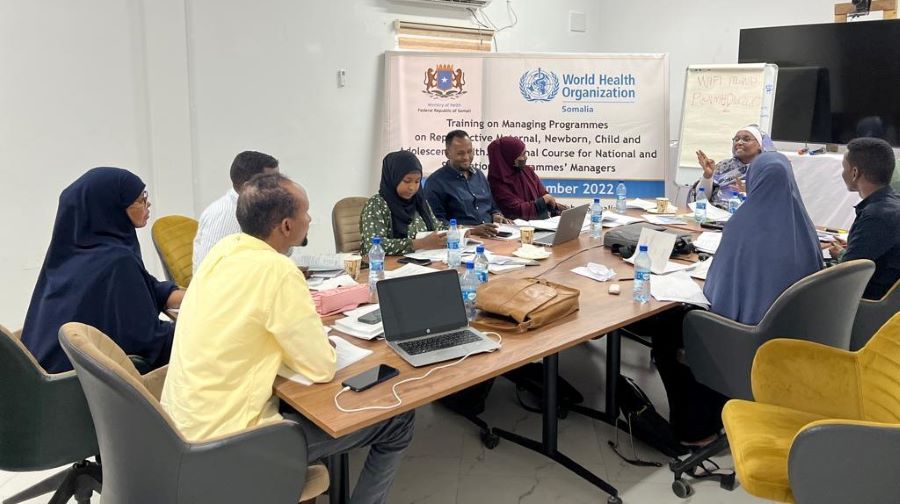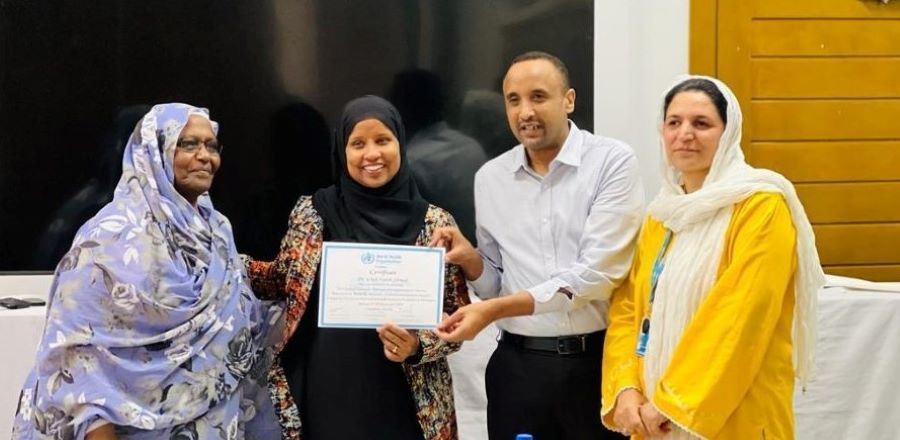 Participants during a group work exercise developing an annual plan for rolling out the national RMNCAH strategy with key deliverables, indicators and budget lines during the 5-day workshop on programme management in Mogadishu, Somalia. Credit: WHO Somalia.
Participants during a group work exercise developing an annual plan for rolling out the national RMNCAH strategy with key deliverables, indicators and budget lines during the 5-day workshop on programme management in Mogadishu, Somalia. Credit: WHO Somalia.
Mogadishu, 1 January 2023 – The ongoing drought and the COVID-19 pandemic has highlighted the gaps in basic service delivery for health and the weaknesses in the health system that prevent it from serving the vulnerable population with good quality care, even in the challenging circumstances. Women and children from marginalized rural communities and camps for internally displaced persons (IDPs) have been significantly impacted by the drought and COVID-19 pandemic, resulting in major inequities and inequalities in the health status of women and children in the country, including in their access to basic health services. Though certain health indicators have shown some progress over the past few years in Somalia, with neonatal mortality and stillbirth rates of 38.5 per 1000 live births and 35.5 per 1000 total births, respectively, and the highest under-5 mortality rate in WHO’s Eastern Mediterranean Region, Somalia is still one of the most dangerous countries for women to give birth and children to be born in.
WHO has been supporting the federal and state ministries of health in strengthening service delivery, especially for women, children and vulnerable populations. To improve reproductive, maternal and child health outcomes, WHO, together with the Ministry of Health, other United Nations agencies and key partners, has developed a national reproductive, maternal, newborn, child and adolescents health (RMNCAH) strategy that sets out priorities and targets for tackling the high maternal and child mortality and morbidity in the country. However, implementing the strategy has proven challenging, requiring various operational considerations.
The challenge, as identified by WHO through several rounds of consultations and field missions, was that the Ministry lacked both the human resources needed to implement the national strategy and the required skills and knowledge to understand the programme management cycle, including planning, budgeting, implementation and monitoring, to make the strategy more results-oriented, accountable and beneficial for the targeted population.
To meet this request from the Federal Ministry of Health, the WHO country office in Somalia, together regional experts, designed a training package, entitled “Managing programmes to improve reproductive, maternal, newborn, child and adolescent health,” based on regional recommendations and evidence-based interventions. The training package builds on the WHO’s established “Managing programmes to improve child health” (2009) package, developed specifically to address the targets and global strategies developed for the Sustainable Development Goals (SDGs), which has not yet been adopted in any of the countries of the WHO Eastern Mediterranean Region. The training package was customized to align with WHO’s country cooperation strategy (2021–2025) and Somalia’s essential package of health services through a series of consultations with the ministry and regional experts.
Enhanced leadership skills for better implementation of evidence-based interventions
WHO piloted the 5-day training package with 17 (including 9 female) directors and public health managers responsible for implementing the RMNCAH strategy at national and subnational levels across Somalia. The training was held in Mogadishu, Somalia, from 18 to 22 December 2022, with 2 core facilitators from the WHO Regional Office for the Eastern Mediterranean and two co-facilitators from the WHO country office for Somalia. To ensure equal participation from all states in the training, the various ministries of health (at both federal and state level) nominated 2 senior health officials from each state and 1 from Banadir Regional Authority (Mogadishu).
The training aimed to build the leadership and programme management capacities of senior health officials to help them translate their technical knowledge about RMNCAH into evidence-based, results-oriented, cost-effective interventions. It is expected that this leadership training will enhance planning, implementation, monitoring and evaluation capacities at the national and subnational levels.
Following the successful pilot training, which received overwhelmingly positive feedback from participants, the training will now be rolled out across the country, incorporating lessons learned and recommendations proposed by the ministry officials and facilitators.
After attending the extensive and interactive training sessions, Dr Ubah Farah Ahmed, Director of Family Health at the Federal Ministry of Health, remarked, “The training provided me with the best cost-effective way of planning, managing and monitoring maternal and child health programmes. The training certainly helped to demystify many of the areas related to management and leadership required to make a national strategy work. I would like to thank WHO for clearly making an informed effort to customize the training to reflect the Somali context. We would certainly make it a mandatory course for all the managers at the subnational level to ensure that we plan with clear objectives and measurable goals.”
The majority of the participants echoed these sentiments, promising to cascade the learning among their peers at the subnational level. Towards the end of the training, the Federal Ministry of Health had already announced its intention to scale up the training by cascading it to the district level to improve implementation of the RMNCAH strategy at all levels.
Additionally, the timing of the training coincided with the annual planning process of both the federal and state ministries of health.
“After this timely and much-required training, we will be able to look at the rollout of the national RMNCAH strategy at the state level in a totally different, well-calculated and measured manner. WHO has been helpful to us in many other ways, but this specific intervention will surely help us realize our objectives of empowering our knowledge capacity, improving our programme management skills and achieving our goals,” said Dr Mohamoud Garun Gas, Director of Family Health for the Jubaland State of Somalia.

Dr Ubah receiving her certificate. Credit: WHO Somalia.
Accelerating RMNCAH to achieve universal health coverage and the SDGs
RMNCAH is fundamental for achieving universal health coverage and is a key driver of the SDGs. In Somalia, maternal mortality ratio is estimated at 692 maternal deaths per 100 000 live births, and 1 in 20 women is expected to die from pregnancy-related causes during their reproductive lifetime.
"We are working in one of the most challenging environments, but we are grateful to the ministries of health (at both federal and state level) and our colleagues at the WHO Regional Office, for making RMNCAH a priority in this country. We feel pride in supporting the willingness of health professionals in the country to learn these skills and cascade them at all levels. Still, we know that by no means is our job done because we have to cover lots of miles to make Somalia a comparatively safe place for mothers and newborns as per the stated SDG 3 and universal health coverage goals. For this, we certainly will need support from all quarters, including our worthy donors, our partners and, more importantly, from the communities,” commented Dr Al-Umra Umar, Programme Lead for RMNCAH at the WHO Somalia country office, while addressing the concluding session of the workshop in Mogadishu.
The Global Strategy for Women’s, Children’s and Adolescents’ Health (2016–2030) aims to keep RMNCAH at the centre of the SDG agenda by providing strategic and concrete guidance on accelerating progress toward ending all preventable maternal, newborn and child deaths, including stillbirths, by 2030. It aims to support countries in improving the overall health and well-being of women, children and adolescents through transformative action. WHO has been supporting Somalia in achieving its SDG targets and improving the health and well-being of all its women and children.
For additional information, please contact:
Kyle DeFreitas, External Relations Officer,
Fouzia Bano, Communications Officer,
-----------------
Note to editors
Please see the links below for additional information on recent support:
Creating a safe environment for mothers and newborns in Somalia








